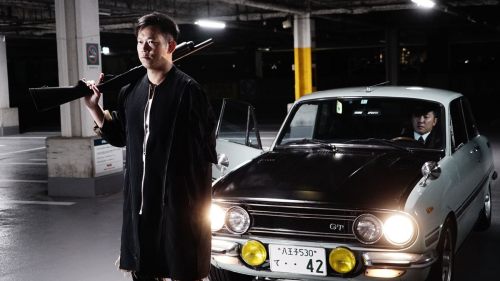Fantastic Fest Review: PELICAN BLOOD Is A Testament To Empathy
In an era when mass shootings have become so prolific that Americans can hardly pass a single day without a news report detailing another horror, a question has seeped into the cultural consciousness: what if my son (or, far less likely, daughter) picked up an assault rifle and took the lives of five, 10, 40 people? How could such a tragedy be avoided – particularly as such violence has metastasized into a seemingly inevitable occurrence? Only in this "modern" age has this question begun to transcend the parental binary; for centuries, mothers have exclusively been dealt a similar hypothetical, though theirs is a question more far-reaching and terrifying: what if my child is a sociopath or (worse) a psychopath? To confront that question is to stare into an evidently bottomless pit of despair; a void that, once noticed, cannot be unseen. That way lies madness.
That way is where we find Wiebke in Pelican Blood, the sophomore feature from German filmmaker Katrin Webbe, who previously destroyed viewers with the gut-wrenching Nothing Bad Can Happen – a somber misnomer for a film based on the true story of a Christian teen in the punk scene who accepts unending torture meted out by his adoptive parental figures because he firmly believes God is testing his faith. Gebbe's first feature was simultaneously nauseating and devastating in its exploration of a depraved vacuum where empathy does not exist. For as much as she tests the limits of her audience's empathy in Nothing Bad Can Happen, Gebbe conducts an exam twice as grueling on her protagonist in Pelican Blood.
Played by the phenomenal Nina Hoss (Germany's formidable answer to Frances McDormand), Wiebke is a single, middle-aged woman who trains horses for local police at her ranch, where she lives with her adopted daughter Nicolina. Wiebke holds a distinct affection for troubled horses, like her current trainee, Top Gun; though others see him as broken, Wiebke knows he has potential. And so it's not terribly surprising when Wiebke adopts another daughter: a five-year-old named Raya who experienced intense trauma as a baby. Raya integrates easily into Wiebke and Nicolina's life at first, but it's not long before she displays disturbing behaviors, including those associated with the psychiatric concept of the Macdonald triad – bed-wetting, animal cruelty, and setting fires. If a subject displays even two of these behaviors concurrently, it's believed to be a strong indicator of sociopathy and/or homicidal tendencies; in Raya's case, she displays all three. Although diagnosed by a psychiatrist as sociopathic and lacking the faculties to empathize with other human beings, Wiebke remains resolute in her commitment to raising Raya. And despite her increasingly violent outbursts and a particularly disturbing revelation regarding the girl's behavior, Wiebke refuses to send Raya back into orphanhood, much to the growing concern of those around her – including a nascent love interest, who understandably worries that Wiebke is prioritizing Raya above Nicolina and putting her life in danger.
Gebbe captures this internal conflict with stunning clarity and an achingly apt amount of grace, her seemingly bottomless well of empathy reflected in the hard-won lines of her face and refracted in the places where her dusty, dusk-tinged ranch meets the smooth glass and tile surfaces of her home – a progressive apparition nestled in a wild and ruggest old west; an oasis. When a police officer casts doubt on Top Gun's potential for rehabilitation, Wiebke counteracts with what is perhaps her most essential perpsective: "The horses aren't the problem." And so it isn't Raya's fault that she's a violent sociopath who may very well be incapable of love and genuine emotion. Her psychiatric condition is not some moral deficiency or failing; it is the failure of those around her with the capacity to offer compassion, but who find themselves incapable of the patience required. Wiebke's commitment to her own sense of empathy feels like an act of defiance. It is an astonishing, emotionally revolutionary thing to behold, not least of all because empathy seems – in our very real world – to be infinitely teetering on the edge of extinction.
Pelican Blood is not a horror film in the traditional sense, but a viscerally emotional and unsettling drama that deals in a horror painfully exclusive to women (and mothers in particular). According to film and television and magazines and Instagram, women's fears are reductively limited to two realms: superficial concerns (cellulite, aging, failure to marry and/or procreate) and the palpable fear of misogynistic violence (rape and/or murder). But Gebbe uncovers another, distinctly feminine fear rooted in our inherent capacity for empathy – a virtue some might trace back to outdated gender norms, and yet it's difficult to deny that, speaking strictly in binary terms, women have traditionally shown more outward empathy than our male counterparts. Wiebke is hardly a saint; she consistently grapples with the limits of her own compassion throughout this emotional and psychological endurance test, driven by fear of failing not only Raya, but her own womanhood – and in a way that is far more meaningful than any conventional depiction of female terror that came before it.



